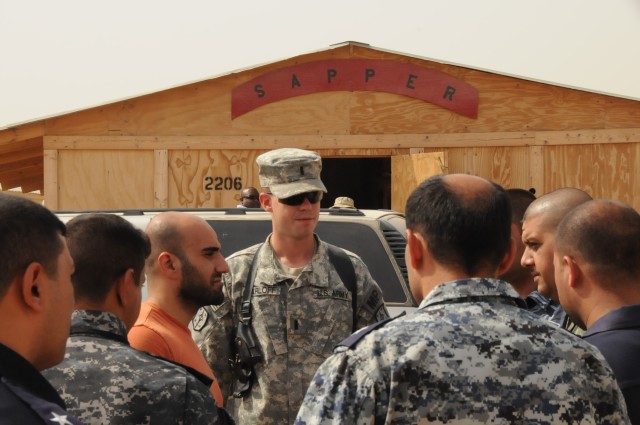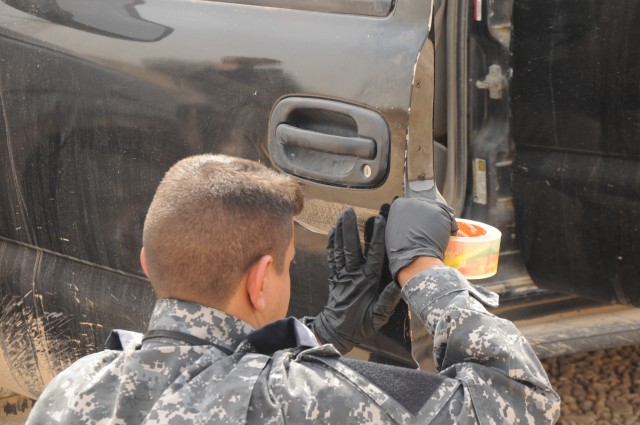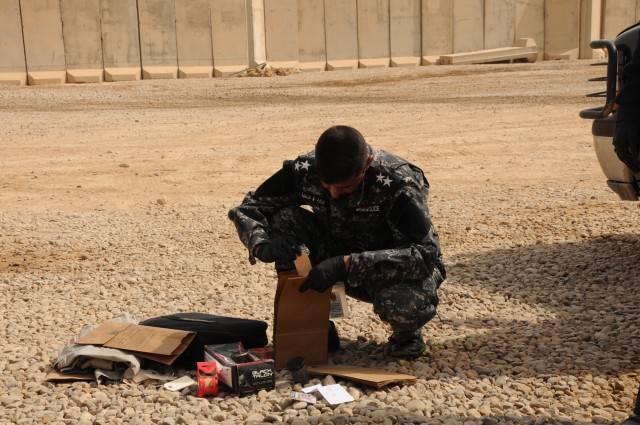FORWARD OPERATING BASE WARHORSE, Iraq - The Iraqi policeman walks up slowly, scanning and searching the side of an abandoned car. He stops for a second, hunches down and looks into the wheel well of a suspicious looking vehicle. The policeman satisfied, nods to his commander and moves off, while another officer takes over to begin the next steps of the investigation.
The scene of the investigation consists of four vehicles called in by a roll player so the Iraqi police can ensure there's no danger for the people operating out of Forward Operating Base Warhorse.
For the Iraqi police force in Baqubah and Soldiers of the 512th Military Police Company, crime scenes and investigations are normal; however, each organization's methods are as different as the uniforms they wear.
The differences of each service prompted both organizations to conduct a combined crime scene investigation course Sept. 24 on Warhorse.
"We brought the Iraqi police here to show them the ways we go over a crime scene," said 1st Lt. Steven Harloff, a platoon leader with the 512th MP Co. "We're both of different police forces and have different ways of operating. Some of the techniques we use to search or cover a crime scene ... may be different for Iraqis, but they can really [and often times] benefit."
The Iraqi police are trained in the fundamental techniques to fight crime. They can cordon off an area, detain individuals, search areas and gather the basic information necessary to arrest suspects breaking the law of Iraq. Things such as dusting for fingerprints, analyzing those prints, and going over powder residue are still difficult skills for many of the law enforcement personnel.
"What we're trying to do is get the Diyala Special Investigation Team started," 1st Lt. Harloff said. "It's currently an investigative team that involves U.S. and Iraqi forces, but what we're doing with a lot of mission rehearsals is refining the Iraqi team concept for them."
The team concept is to gather all the different elements together - the policemen who handles the initial investigation, the officers who go over the evidence, and the personnel who analyze the prints, and get them working side-by-side to hone the advanced police officer skills.
"The training we're doing is showing them safer methods to search a vehicle, how to properly check for prints, and how to deal with bystanders near the scene of a crime," 1st Lt. Harloff said. "All of this together will help get the Diyala investigate team more skilled in their tasks to better analyze crime scenes. Basically, it's CSI, the proper way to analyze everything in a crime scene."
During the training, Iraqi police dismounted from mine resistant ambush protected vehicles [MRAPs] and taped off the crime scene ... securing the area. The policemen then broke off into two teams, one group to search the vehicles, another group to question the bystanders.
"We saw a lot of things immediately when they began the steps to search the scene," 1st Lt. Harloff said. "One group immediately called in explosive ordnance disposal [EOD] when they found a "sticky bomb," the other questioned the bystanders before they could leave the area."
The Anandale, Minn., native remarked the Iraqi police he's witnessed have come a long way based on what he witnessed in the CSI training. The consistent training throughout the years has improved the Iraqi Police force methods to investigate a crime scene.
"They are coming along real well," 1st Lt. Harloff said. "Anytime we can have an opportunity to work with them is a good experience for everyone because we can see what they do well and give them advice to improve on areas they might be lacking."
Since the start of Operation New Dawn, the focus has shifted for U.S. troops to a "advise and assist" role in Iraq. The Iraqis have taken the lead role in protecting their country.
For the Iraqis taking part in the Warhorse training, their focus hasn't shifted but has remained steadfast - to improve on what they know and take the steps skills necessary to learn what they don't know.
"The American officers [law enforcement personnel] are very skilled in many of the information gathering techniques," said Captain Ahdib Sa'ad haid, an Iraqi Police officer from the Diyala IP station.
He added, "Just the methods of ways they search a vehicle are different from the ways we do a search, so these classes provide good opportunities to learn. All of us here today are going to take what we have learned, all the new methods we have seen, and return to our stations to train our personnel to improve our crime fighting skills."
For Soldiers with the 512th MP Co., training, advising, and assisting has become the mission, as they help further move on to the day where Iraqis handle the security on their own.
"These courses really do make a big difference for the Iraqi police," said Pfc. Nicole Gray, a military policeman with the 512th MP Co. "I'm glad we're working with them because what we see gives us all confidence that the IPs will be in good shape for when we leave this country."
As the training ended, the Iraqi police forces left Warhorse with more knowledge under their belt to hone their skills and ensure success in future operations where Iraqis are the sole defenders of their country.






Social Sharing